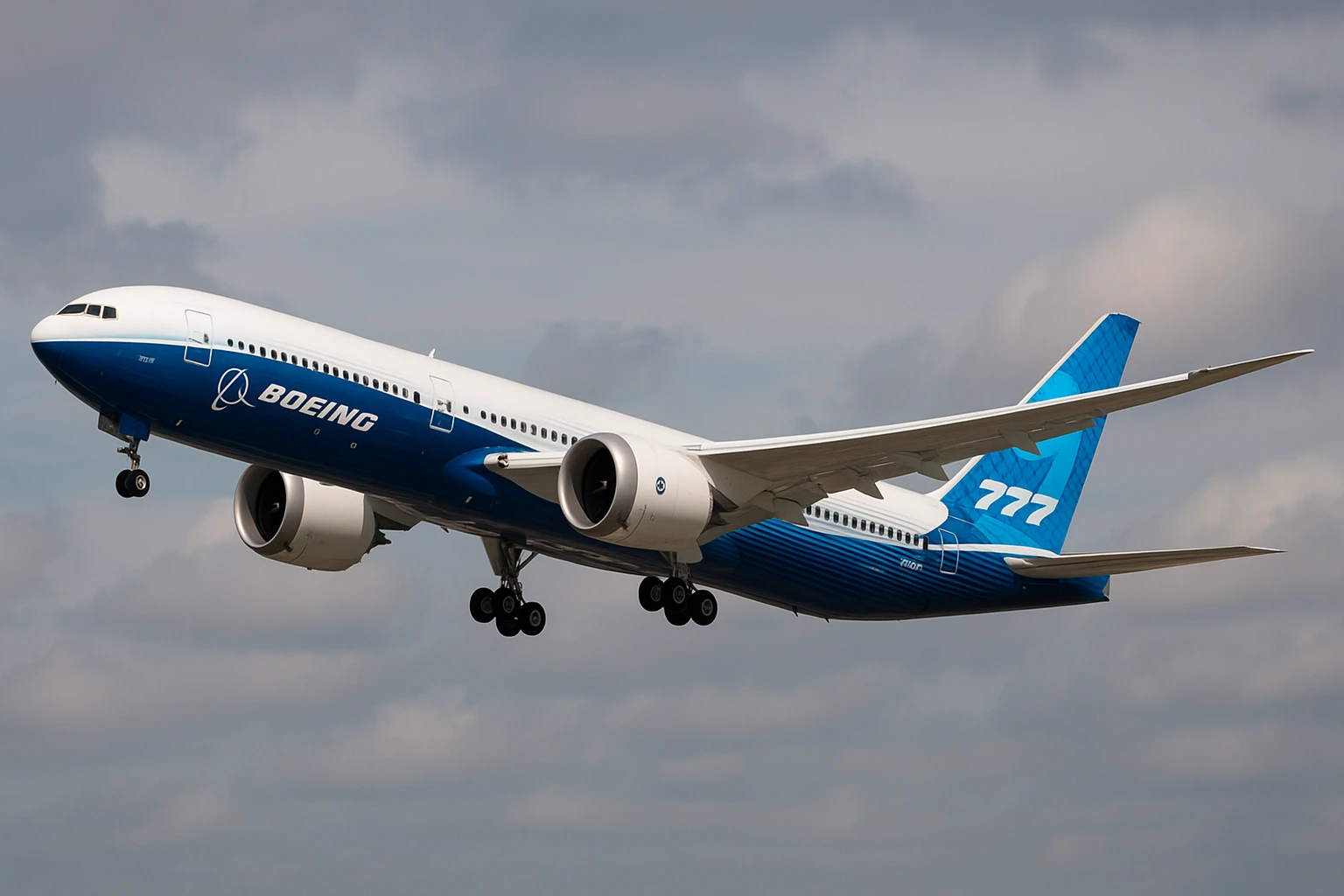Boeing Co. has announced another major setback to its long delayed 777X aircraft program, taking a nearly $5 billion charge and pushing the first delivery to 2027.
The move adds to a series of financial and operational blows for the planemaker as it struggles to stabilize production and regain investor confidence after years of disruptions.
The company disclosed Wednesday that the delay extends the 777X timeline by another year from the previously expected 2026 launch.
Originally unveiled in 2013 with first delivery targeted for 2020, the aircraft has now become one of Boeing’s most troubled commercial jet programs.
The 777X, a next generation variant of Boeing’s best-selling 777 widebody, was designed to compete with Airbus’s A350 in the long haul market.
With new GE9X engines, folding wingtips, and enhanced fuel efficiency, the aircraft was expected to serve as Boeing’s flagship for decades.
However, a series of certification delays, supply chain setbacks, and quality control issues have repeatedly pushed back its timeline.
In its third quarter earnings report, Boeing said total charges on the 777X program now stand at roughly $15 billion, including compensation to airlines for missed delivery deadlines.
The most recent charge covers customer penalties and updated production costs. The 777X remains a critical part of our future widebody strategy, but we are taking the necessary steps to ensure the airplane meets our standards of safety and performance,” Boeing CEO Kelly Ortberg said in a statement.
While progress continues, significant work remains ahead. Aviation analysts say the latest delay highlights the depth of Boeing’s ongoing challenges even as it seeks to rebuild its manufacturing credibility following the 737 MAX crisis.
“This is a blow to Boeing’s efforts to restore confidence among investors and airline customers,” said Mark Delaney, senior aerospace analyst at Horizon Capital Partners.
“The 777X was supposed to symbolize Boeing’s rebound in widebody production. Instead, it’s turning into a prolonged financial drag.”
Delaney added that certification hurdles remain a major barrier, as the Federal Aviation Administration (FAA) has increased scrutiny of Boeing’s engineering and documentation processes since the MAX grounding in 2019. The FAA won’t approve shortcuts this time, he said. “Every aspect of testing must be validated.”
Industry observers note that Boeing’s European rival, Airbus, has gained ground with its A350 1000, now the primary competitor in the long range twin aisle category. Several airlines have reportedly shifted orders or delayed decisions due to uncertainty surrounding the 777X’s schedule.
Despite the 777X setback, Boeing reported positive trends elsewhere in its operations. Quarterly revenue rose 30 percent year over year, beating Wall Street expectations, while free cash flow turned positive at $238 million the company’s first positive result since 2023.
The planemaker delivered 55 aircraft in September, its strongest monthly performance since 2018, recovering from production halts linked to a 2024 strike involving 33,000 factory workers.
Boeing also received FAA approval earlier this month to increase 737 MAX production to 42 jets per month, up from a cap of 38 imposed after a mid air panel blowout in January 2024.
However, Boeing still reported a net loss of $5.34 billion, or $7.14 per share, for the quarter ending September. Analysts surveyed by LSEG had expected a narrower adjusted loss of $4.59 per share.
The larger than anticipated deficit underscores the cost pressures and delivery challenges facing the manufacturer. Within Boeing’s workforce, employees expressed both frustration and cautious optimism.
Everyone here knows how important the 777X is, said Lisa Hanley, a systems engineer at Boeing’s Everett, Washington, plant. We’ve seen setbacks before, but there’s a strong commitment to getting this airplane certified the right way this time.
Union leaders, however, raised concerns about morale and project management. The workforce is dedicated, but morale has taken a hit, said Tom Bennett, a representative of the International Association of Machinists.
“Workers have endured years of schedule changes and uncertainty. They just want a stable plan that holds.” Airline customers have also grown weary of delays.
A spokesperson for Emirates, one of the largest 777X customers, said the airline remains committed to the program but emphasized the need for transparency.
“We understand the complexities involved, but consistency and clear communication are essential for our fleet planning,” the spokesperson said.
Analysts suggest Boeing’s future hinges on successfully executing both the 737 MAX ramp up and 777X certification while managing supply chain constraints.
The company’s widebody business remains crucial for profitability, particularly as global travel demand rebounds in Asia and the Middle East.
“The 777X delay is painful in the short term, but if Boeing can deliver a safe, efficient aircraft, it could still become a long term success,” said aviation consultant Priya Nair of AeroVista Analytics.
The challenge now is regaining credibility with regulators and customers. Boeing executives have indicated that test flights and certification work will accelerate through 2026, with full rate production planned for 2028.
The company aims to secure type certification from the FAA by late 2026, clearing the path for the first customer delivery the following year.
Boeing’s $5 billion charge underscores the lingering fallout from its manufacturing and certification woes.
While signs of operational improvement appear in other parts of the business, the 777X program remains a test of Boeing’s ability to deliver on its promises after a decade of turbulence.
Whether the aerospace giant can overcome these challenges will determine not only the fate of the 777X but also Boeing’s long-term standing in the global aviation industry.
